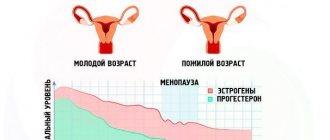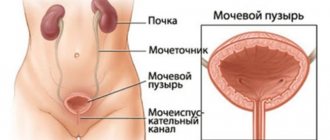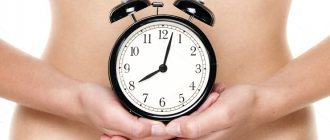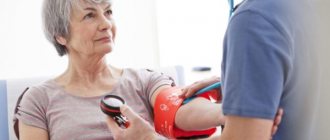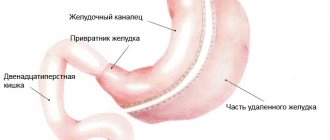About early menopause
Premature menopause can be a sign of pathological changes in a woman’s body. Therefore, at the first menopausal symptoms, at about 30 years of age, you should try to find the cause of the hormonal disorder. Early menopause occurs in one out of a hundred patients.
Normally, menopause occurs around 45 years of age. His earlier arrival will already be considered premature. And if menopause occurs at 30, then this should be a serious sign of concern. Doctors say that the earlier the first symptoms of menopause appear, the more difficult it will be to get rid of them.
The female reproductive system consists of more than just the pelvic organs. A significant role is played by the brain, or more precisely, the pituitary gland and hypothalamus. If the functioning of these components of the system is disrupted, a woman experiences early menopause at 40 years of age or earlier.
The number of follicles in the ovaries with this disorder decreases, and as a result of such changes, the secretion of estrogen also decreases.
Early menopause is divided into several stages:
- Premenopause. A period lasting approximately 6 years. It is measured from the moment the first signs of the disorder appear and until the end of the last menstruation.
- Menopause is a period when there are no periods for 12 months.
- Postmenopause: Begins after menopause and continues until approximately age 65. The early form is the period of the first five years after the cessation of menstruation, the late form is after 5 years.
This reproductive disorder must be treated in the early stages of development.
Psycho-emotional symptoms
During menopause, the female body suffers not only from physiological changes, but also from disturbances in the functioning of the nervous system. Symptoms such as depression, apathy appear, the woman loses the ability to enjoy the events in her life, even new purchases do not bring pleasure. Self-esteem decreases, symptoms such as causeless anxiety, irritability, and sleep disturbances occur.
Signs such as headaches, leg cramps, and painful sensations in the joints often appear, which are caused by a lack of calcium in the body. During hormonal changes and the cessation of estrogen production, symptoms such as dizziness, deterioration in memory and concentration appear. If you consult a doctor in a timely manner and undergo appropriate examinations, you can dull the unpleasant symptoms of menopause and make early menopause less painful for a woman’s body.
Causes
Most often, with the onset of early menopause at 30-40 years of age, the effect is on the ovaries. It is quite difficult to restore their correct operation. The reasons for these violations may be:
- Mutational genetic changes. The problem formed on the basis of genetics is the most difficult to solve. In such women there is practically no ovulation, and pregnancy is achieved by taking hormonal drugs.
- Heredity. In this case, women experience early menopause during the development of a hereditary disease. For example, galactosemia is accompanied not only by premature menopause, but also by deterioration of vision, changes in the brain and liver. And blepharophimosis leads to early menopause and eye damage.
- Damage and trauma to the pelvic organs.
- Completed abortions and gynecological cleansings.
- Diseases of the endocrine system.
- As a result of surgical intervention on the pelvic organs (excision of cysts, fibroids). During such changes, non-microbial inflammation may begin, adhesions may form, or functional tissue may be damaged.
- Resistant ovarian syndrome (amenorrhea, infertility).
- Radiation therapy. With strong radiation, especially to the pelvic organs, ovarian function will be impossible to restore.
- Chemotherapy. Like radiation therapy, it kills healthy follicle cells that cannot be restored.
- Shereshevsky-Turner syndrome is a pathology associated with a congenital disorder of the number of sex chromosomes.
- Deviations in the hypothalamic-pituitary region.
- Autoimmune diseases. With such pathologies, the cells native to the body are perceived aggressively by it. As the disease progresses, the gonads become inflamed and the follicles become scarred.
- Inflammation in the pelvic organs.
- Uncertain reasons. Sometimes a doctor cannot determine why a woman has symptoms of early menopause, since there are many reasons for this related to the patient’s lifestyle. These include bad habits, viral infections or taking potent drugs.
Possible consequences
One of the most obvious and, alas, irreversible consequences is the lack of reproductive function. This is especially sad for those who put off having a child until later, deciding to make a career first.
Pregnancy is possible as long as menstruation continues, however, if you do not want to have children, experts recommend using contraception for another year from the end of your last menstruation.
When early menopause occurs, it is necessary to consult a doctor and undergo a series of diagnostic measures in order to identify the causes of this phenomenon and improve the quality of life for this period. The fact is that some quite dangerous diseases also have symptoms similar to those of menopause. In addition, menopause itself often serves as a trigger for the development of various dangerous ailments, including oncology.
In addition, various diseases of the musculoskeletal system, disturbances in the functioning of the cardiovascular system and more may develop.
Another danger is that the symptoms of early menopause are similar to the signs of other dangerous diseases, so it is advisable not to delay contacting a specialist.
To reduce the risk of early menopause, doctors recommend engaging in simple sports, such as Pilates.
Signs of early menopause
Symptoms of early menopause are similar to those of menopause after 40 years:
- menstrual irregularities progressing to a complete absence of menstruation;
- inability to conceive a child;
- lack of estrogen with its characteristic symptoms.
Menopause does not occur abruptly; the body prepares for it gradually over 2-4 years. At first, signs of early menopause may be as follows:
- irregular menstruation with periodic absence of ovulation;
- profuse bleeding occurring on any day of the cycle;
- increased sweating, with a feeling of heat and redness in the face, neck and chest;
- migraines and dizziness;
- problems with memory and concentration;
- hot flashes accompanied by rapid heartbeat (tachycardia);
- sleep problems (insomnia or drowsiness);
- possible chills;
- pain during sexual intercourse;
- blood pressure surges;
- change in a woman’s emotional state (deterioration of mood, unreasonable aggression, short temper, tearfulness and depression);
- problems with excess weight as a result of the cessation of the production of sex hormones.
At the second stage of the disorder, the following symptoms of early menopause are observed at age 30 or later:
- skin aging (dryness, dehydration and wrinkles), due to decreased collagen production;
- brittleness and thinning of nails and hair;
- drying of the vaginal mucosa (accompanied by itching and redness), interfering with a woman’s intimate life;
- problems with urination (pain, difficulty), as a result of decreased elasticity and sagging of the bladder sphincter. This problem leads to the formation of diseases of the genitourinary system such as cystitis, incontinence, etc.
Treatment with royal jelly
Royal jelly belongs to apiproducts, i.e. products obtained from beekeeping. It is obtained during the period when bees reproduce. Using the product during menopause can relieve symptoms associated with nervous system disorders. Its use helps normalize sleep, leads to mood stabilization, and eliminates disorders of the autonomic nervous system.
Tinctures and medicinal teas
In the early menopause, the use of various tinctures by women will be very effective.
You can prepare the tincture according to the following recipe. To do this, you will need 100 g of high algae roots. They must be filled with half a liter of 70-degree alcohol. You need to insist for 2 weeks. The place for infusion should be dark. All this time, the contents must be shaken periodically. Take 30 drops. When taking the product, wash it down with water. This should be done 3 times a day for 2 months.
Instead of tall zamanika roots, you can take calendula flowers. The preparation of the tincture and the dosage regimen are the same. In this case, the woman can get rid of headaches and normalization of sleep occurs. You can brew tea using blackberry fruits and leaves. You can brew flowering clover heads. Tea with linden flowers will be very effective. It is useful for menstrual irregularities.
How to eat during menopause, some tips
When menopause occurs, the production of female sex hormones stops. Their synthesis occurs not only in the ovaries, but also partly in adipose tissue. Therefore, the body tends to accumulate fat tissue. In order not to gain weight during menopause, you need to eat right. Some tips will help with this:
- You need to forget about all diets. Instead, it is better to reduce the amount of food consumed per day.
- It is recommended to count calories. You should consume no more than 1500 calories per day. This is quite enough to replenish the body with everything necessary.
- You need to eat more foods rich in calcium. Estrogens help calcium absorption. With their deficiency or absence, calcium begins to be washed out of the bones, as a result of which they become excessively fragile. Every day there should be fermented milk products rich in this microelement on the table. Moreover, the fat content should be at least 2.5%. Calcium is absorbed better from such foods.
- It is necessary to exclude everything fried from the diet.
- The daily diet should contain a sufficient amount of vegetables.
- During menopause, a woman should consume enough seafood. Polyunsaturated fatty acids will help provide protection against atherosclerosis.
- There should be a minimum amount of salt in the diet. Its excess leads to increased blood pressure and the appearance of edema.
- It is necessary to consume more soy products because they contain natural estrogens.
If you find a typo or inaccuracy, please select a piece of text and press Ctrl+Enter.
Stages of early menopause
Doctors distinguish three degrees of manifestation of early menopause. The first is characterized by the fact that a woman is able to lead a completely high-quality life, but at the same time experiences no more than 10 hot flashes per day.
The second stage of early menopause is marked by problems with sleep, memory, migraines, dizziness, and urination. During this period, up to 20 tides occur per day.
The third, most severe stage of early menopause, is characterized by a strong decrease in performance and the manifestation of dangerous and most unpleasant symptoms.
Why is early menopause dangerous?
The first two stages of early menopause at 30-40 years of age are described above and look quite harmless. But this is not a complete list of symptoms of such a deviation. Premature menopause is dangerous primarily because of its possible consequences.
At the third stage of early menopause, the following may begin:
- Osteoporosis. This pathology is characterized by fragility and fragility of bones, which often leads to fractures.
- Atherosclerosis. With this disease, blood cholesterol levels rise, increasing the risk of cardiovascular disease and developing diabetes at age 38 or less.
- Hypertension. A woman’s vascular walls weaken, blood circulation deteriorates, cholesterol plaques appear and a constant increase in pressure is observed. The consequence of such disorders in the body can be a heart attack, stroke or non-healing fractures.
- Autoimmune diseases (Hashimoto's thyroiditis, baldness, adrenal insufficiency).
In addition, early menopause in women 40 years of age or younger can cause the development of cancer in the uterus, ovaries or mammary glands. To avoid such consequences, you should adhere to preventive measures to prevent the occurrence of premature menopause.
Age for early menopause
Early menopause in women under 40 is called premature menopause. If this occurs spontaneously, it is called premature ovarian failure. Premature ovarian failure affects about 1 in 100 women. About 8 in 100 women experience premature menopause due to other causes, such as chemotherapy or surgery. Menopause occurring between 40-45 years of age is called early menopause, which affects approximately 5% of women.
Premature menopause at an early age: risk factors
Factors associated with an early diagnosis of menopause include smoking, nulliparity, hysterectomy, HIV infection, drug use, early and premature menopause in close relatives and adverse life events. There is no evidence that early menopause is associated with the use of oral contraceptives, fertility drugs or artificial hormones.
Does early menopause have any consequences in women?
Early menopause, when the age of onset is less than 35 years, always has long-term physical and psychological consequences, so women may require emotional support and constant medical supervision.
There is currently no specific predictor for early menopause. Although anti-Mullerian hormone has been identified as a potential predictor of menopause, problems with assay sensitivity/validity preclude its routine use at present. Diagnosis is often delayed because the woman or her doctor does not consider the possibility of menopause as a cause of her symptoms.
What are the dangers of early menopause and who to contact in this condition?
It is important to remember that the diagnosis of early menopause, when diagnosed in fairly young women, can be very stressful. Early menopause can affect women's physical health and well-being, as well as their relationships, emotional well-being and sense of self-identity. A woman should be satisfied with her doctor, since regular visits to a medical facility will be required to achieve the best results in the treatment of this disease.
Signs of early menopause
Menopause usually brings with it a variety of symptoms that can be unpleasant at best, and at worst can increase your risk of heart disease and early death. For women who go through early menopause, these symptoms and health risks may be worsened, regardless of whether the transition is natural or due to surgery.
Estrogen has long been considered a "protective factor", especially for the heart and blood vessels, based on the observation that women aged 20-50 years are much less susceptible to coronary heart disease and other atherosclerotic diseases compared to men.
Women who go through early menopause spend most of their lives without the "protective" effects of estrogen. In addition to an increased risk of heart attack or stroke, they are also more likely to develop high blood pressure and high cholesterol earlier in life. Research has also shown that women are 50% more likely to gain weight after menopause, which can also negatively impact their cardiovascular health.
Humanity has been searching for a cure for aging for a long time. Unfortunately, research has shown that menopause significantly contributes to and actually accelerates the aging process in women. Research shows that menopause increases cellular aging by an average of 6 percent, which begins to add up throughout life. Biologically, a woman who goes through menopause at age 42 will be six months older at age 50 than a woman who goes through menopause at age 50.
A diagnosis of early menopause can feel overwhelming and devastating to a woman, but remember, you are not alone and good support can be vital to helping you cope with the diagnosis.
For women diagnosed with early menopause, a specialized forum can help them come to terms with and accept themselves, find like-minded women to communicate with each other and share their experiences and strategies for relieving symptoms.
It is important to remember that being diagnosed with early menopause does not mean that you are now less of a woman, less desirable, or in any way inferior.
Treatment
But most women are not only concerned about the causes of early menopause; they are also interested in measures to combat this problem. First of all, if you have suspicious symptoms, you should consult a doctor. In no case should you engage in arbitrary treatment, this can lead to even greater complications.
The very first alarming symptom should be the absence of menstruation for 3 cycles. To confirm the diagnosis, a woman will need to undergo hormone tests. In case of illness, FSH will be increased, and estrogen and progesterone will be decreased.
Among other things, the patient may be prescribed a transvaginal ultrasound. It can reveal thinning of the endometrium, as well as formations characteristic of myometrial fibrosis. The doctor may also refer the patient for Doppler ultrasound, MRI or ECG.
After analyzing the woman’s condition, the gynecologist will be able to say for sure whether there is a chance to reverse this process. But in most cases, patients are prescribed drugs that relieve the unpleasant symptoms of early menopause, but do not restore reproductive function.
You can try to stop the symptoms and manifestations of early menopause only with irregular menstruation. Then the woman is usually prescribed hormone replacement therapy in the form of the following drugs:
- Femoston;
- Divitren;
- Divigel;
- Eviana;
- Cyclo-Proginova.
These drugs contain artificial hormones that help the body cope with this period of life. They allow a woman:
- overcome hot flashes, migraines and sleep disorders;
- improve the condition of bones, blood vessels and nervous system;
- speed up metabolism, balance lipids and carbohydrates;
- improve the condition of the skin and mucous membranes;
- avoid the development of osteoporosis, fractures of the limbs and musculoskeletal system.
The forms of drug release can be varied (tablets, capsules, patches, vaginal creams, gels or suppositories) and should, like all other treatments, be agreed upon with the doctor.
In case of contraindications to taking hormonal drugs for early menopause (increased blood clotting, malignant or benign neoplasms, pregnancy, cirrhosis of the liver, etc.), they can be replaced with products with natural ingredients:
- Climaxan;
- Femiwell;
- Estrovel.
Many women are afraid to take pharmaceutical drugs and start treatment with herbal medicines. These include sage, clover, blackberry, chamomile, hawthorn, valerian, motherwort and calendula. You must understand that these medications do not guarantee a cure for early menopause in a woman, and their use must be agreed upon with a gynecologist.
To eliminate unpleasant dryness in the vagina, Ovestin or Divigel are used.
You can prevent the development of early menopause at the age of 30-40 by visiting a gynecologist's office in a timely manner and undergoing the necessary tests. It will also be useful to monitor your diet and lead a healthy lifestyle, giving up bad habits.
Prevention
Simple recommendations will help prevent the occurrence of pathology:
- rejection of bad habits;
- childbirth before 35 years of age:
- stress prevention;
- regular visits to the gynecologist (every six months);
- timely and adequate treatment of gynecological pathology;
- maintaining a healthy lifestyle (active outdoor recreation, walks, balanced nutrition).
Video: HOW TO PREVENT EARLY CLIMAX
Attention!
This article is posted for informational purposes only and under no circumstances constitutes scientific material or medical advice and should not serve as a substitute for an in-person consultation with a professional physician.
For diagnostics, diagnosis and treatment, contact qualified doctors! Number of readings: 121 Date of publication: 10/11/2019
Author of the article: Sozinova Anna Vladimirovna
Obstetrician-gynecologist / Experience: 19 years
Prevention of early menopause
In order not to face long-term treatment or the terrible problem of infertility resulting from menopause in the future, a woman must adhere to a number of simple rules. Of course, they will not be effective in case of genetic predisposition, but they will help those who are faced with early menopause for reasons related to lifestyle. What can a woman do?
- Take care of your health and treat diseases under the supervision of specialists.
- Be regularly examined by a doctor and, if necessary, treat inflammation.
- Lead a careful sex life, without casual partners.
- Avoid abortion.
- Exercise. It is necessary to be active every day (walking, jogging, sports).
- Avoid harmful addictions.
- Eat properly and balanced. You should try to exclude fried, fatty and sweet foods from your diet.
- Pay attention to unusual behavior of the body.
- Try to protect the abdominal area from injury, and if necessary, give preference to the safest methods of surgical intervention.
By observing all these measures, a woman can be calm about her health for many years.
Early menopause poses a serious threat to a woman’s body. But if detected early, its manifestations can be effectively controlled.
The article was checked by an expert - practicing family doctor Elizaveta Anatolyevna Krizhanovskaya.

